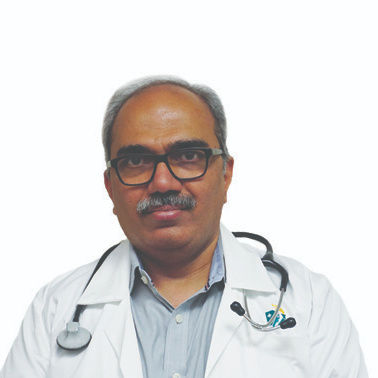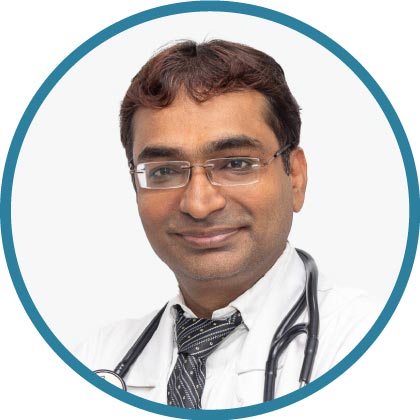COPD Prevention Methods
Discover effective COPD prevention methods, including quitting smoking, avoiding lung irritants, improving air quality, staying active, and keeping up with essential vaccinations to protect lung health.

Written by Dr.Sonia Bhatt
Last updated on 3rd Jul, 2025
Introduction
Chronic obstructive pulmonary disease (COPD) is a long-term lung condition caused by damage to the lungs. This damage leads to inflammation and swelling within the airways, restricting airflow in and out of the lungs, a condition known as obstruction. COPD is primarily caused by prolonged exposure to harmful substances such as smoke, fumes, dust, or chemicals, with cigarette smoke being the leading cause. Although COPD is a progressive condition, it is manageable. With the right treatment and lifestyle changes, most people with COPD can control their symptoms, improve their quality of life, and reduce the risk of associated health complications such as heart disease and lung cancer. In this article, we will learn all about COPD.
Types of COPD
COPD includes both emphysema and chronic bronchitis, and most people with COPD experience symptoms of both conditions.
Emphysema: It occurs when the alveoli (tiny air sacs in the lungs) become damaged and enlarged, reducing their ability to transfer oxygen into the bloodstream. The primary symptom is breathlessness (dyspnoea).
Chronic bronchitis: It is characterised by inflammation of the large airways, leading to narrowing and excessive mucus production. A persistent cough is the most common symptom.
Causes of COPD
The causes of COPD are as follows:
Smoking: The leading cause of COPD, particularly in developed countries. Long-term smoking damages the lungs and restricts airflow.
Secondhand smoke: Exposure to cigarette smoke from others can also contribute to lung damage.
Air pollution: Prolonged exposure to polluted air can increase the risk of COPD.
Occupational exposure: Inhaling dust, fumes, vapours, or chemicals in workplaces can lead to lung irritation and long-term damage.
Household pollution: In developing countries, exposure to smoke from burning fuel for cooking or heating in poorly ventilated homes is a major risk factor.
Genetic factors: A rare genetic condition called alpha-1 antitrypsin deficiency ("alpha-1") can lead to lung damage and increase the risk of COPD, even in non-smokers.
Lung damage without symptoms: Not all long-term smokers develop noticeable COPD symptoms, but they may still have reduced lung function. Some may have other lung conditions misdiagnosed as COPD.
Risk Factors of COPD
While smoking is the biggest risk factor for COPD, other factors can also contribute to its development. You may be at a higher risk if you:
Tobacco smoke – Long-term smoking significantly increases the risk of COPD. The more you smoke, the greater the risk. Pipe, cigar, and marijuana smoking, as well as exposure to secondhand smoke, also contribute.
Asthma – People with asthma, a condition that narrows and inflames the airways, may have a higher risk of developing COPD. Smoking further increases this risk.
Workplace exposure – Long-term inhalation of chemical fumes, smoke, vapours, and dust in certain work environments can cause lung damage and raise the risk of COPD.
Air pollution – Prolonged exposure to polluted air, both indoors and outdoors, can contribute to lung irritation and COPD development.
Household fumes – In developing countries, exposure to fumes from burning fuel for cooking or heating in poorly ventilated homes increases the risk of COPD.
Genetic factors – A rare genetic disorder called alpha-1 antitrypsin (AAT) deficiency can lead to lung damage, making some individuals more susceptible to COPD, even if they do not smoke. Other genetic factors may also increase susceptibility in smokers.
Age – COPD is more commonly diagnosed in people over the age of 65.
Frequent childhood respiratory infections – Repeated lung infections in early life can increase the risk of lung damage and COPD later in life.
Sex – People assigned female at birth may have a higher risk of developing COPD, possibly due to differences in lung size and response to toxins.
Symptoms of COPD
COPD symptoms often do not appear until significant lung damage has occurred. Over time, symptoms tend to worsen, particularly if exposure to irritants such as cigarette smoke continues.
1. Common Symptoms of COPD
Shortness of breath – Difficulty catching your breath, especially during physical activity.
Wheezing – A whistling or squeaky sound when breathing.
Persistent cough – Often produces a large amount of mucus, which may be clear, white, yellow, or greenish.
Chest tightness – A feeling of heaviness or discomfort in the chest.
Fatigue – Feeling very tired or lacking energy.
Frequent lung infections – Increased susceptibility to colds, flu, or pneumonia.
Unintentional weight loss – May occur as the disease progresses.
Swelling – Swollen ankles, feet, or legs due to fluid retention.
2. COPD Exacerbations (Flare-ups)
People with COPD may experience periods when symptoms worsen suddenly. These episodes, known as exacerbations, can last for several days or weeks and may be triggered by factors such as cold air, air pollution, strong smells, respiratory infections, or allergens.
During an exacerbation, symptoms may include:
Increased breathlessness: Struggling more than usual to breathe.
Chest tightness: A worsening sensation of pressure in the chest.
More frequent or severe coughing.
Increased mucus production: Mucus may change in colour or become thicker.
Fever: A sign of infection or inflammation.
Prevention Strategies
COPD is largely preventable, and taking proactive measures can help reduce the risk of developing the condition or worsening existing symptoms. Avoiding lung irritants, maintaining a healthy lifestyle, and staying up to date with vaccinations are key steps in prevention.
Lifestyle Changes to Prevent COPD
The lifestyle changes required to prevent COPD are as follows:
Stop smoking: The most effective way to prevent COPD is to avoid smoking. If you already smoke, quitting can slow the progression of the disease and improve lung function.
Avoid secondhand smoke: Exposure to tobacco smoke, even if you do not smoke yourself, increases the risk of lung damage.
Reduce exposure to air pollution: Try to limit exposure to air pollution, fumes, dust, and chemical vapours in both home and work environments. If your job involves exposure to lung irritants, use protective masks and follow workplace safety guidelines.
Improve indoor air quality: Ensure proper ventilation at home, avoid using strong chemicals, and consider using air purifiers to reduce indoor pollutants.
Stay physically active: Regular exercise helps improve lung function and overall health, reducing the risk of complications related to COPD.
Vaccinations and Regular Health Check-ups
The vaccinations and regular health check-up required for COPD are as follows:
1. Get vaccinated: People with COPD are more vulnerable to respiratory infections, which can lead to serious complications. Staying up to date with vaccinations can help protect against illnesses such as:
Influenza (flu) vaccine: Recommended annually to reduce the risk of flu-related exacerbations.
Pneumococcal vaccine: Helps protect against pneumonia, a common cause of severe COPD flare-ups.
COVID-19 vaccine: Important for preventing severe respiratory infections.
RSV vaccine: Recommended for some individuals, particularly older adults, to prevent respiratory syncytial virus (RSV) infections.
2. Practice good hygiene: Washing hands frequently, disinfecting surfaces, and avoiding crowded places during cold and flu season can help prevent infections.
3. Attend regular check-ups: Routine medical check-ups allow healthcare professionals to monitor lung health, adjust treatment plans, and detect any complications early.
4. Seek support for mental well-being: COPD can impact mental health, leading to stress, anxiety, or depression. Speaking to a healthcare professional or counsellor can help manage emotional well-being.
Conclusion
Chronic Obstructive Pulmonary Disease (COPD) is a serious yet manageable lung condition that significantly impacts quality of life. While it is a progressive disease, early diagnosis, proper treatment, and lifestyle changes can help slow its progression and alleviate symptoms. Avoiding lung irritants, quitting smoking, staying active, and keeping up with vaccinations are key steps in managing COPD and preventing complications. Regular medical check-ups and a proactive approach to lung health can improve overall well-being. By taking the right precautions and seeking timely medical support, individuals with COPD can lead healthier and more fulfilling lives.
Consult Top Respiratory Disease Specialist
Consult Top Respiratory Disease Specialist

Dr. S Mallikarjun Rao
Pulmonology Respiratory Medicine Specialist
22 Years • MBBS, MD (Pul.), FCCP
Hyderguda
Apollo Hospitals Hyderguda, Hyderguda
(75+ Patients)

Dr Abhishek Verma
Pulmonology Respiratory Medicine Specialist
5 Years • MD (Respiratory Medicine), PDCC (Interventional Pulmonology) Alumni SGPGIMS & KGMU Lucknow
Lucknow
Apollomedics Super Speciality Hospital, Lucknow
(50+ Patients)

Dr. Vybhav Vijendra
Pulmonology Respiratory Medicine Specialist
10 Years • MBBS, MD
Bengaluru
Apollo Hospitals Sheshadripuram, Bengaluru

Dr. Sumant Mantri
Pulmonology Respiratory Medicine Specialist
15 Years • MBBS, DNB, FCCP
Bengaluru
Apollo Hospitals Bannerghatta Road, Bengaluru
(75+ Patients)

Dr. Mahavir Bagrecha
Pulmonology Respiratory Medicine Specialist
14 Years • MBBS, MD (PULMONOLOGY)
Pune
Swash Chest and Diabetes Clinic, Pune
(50+ Patients)
